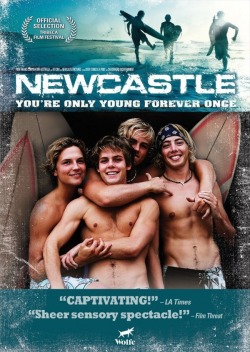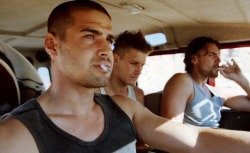Newcastle (2008) – Dan Castle
Director: Dan Castle
Writer: Dan Castle
Cast: Lachlan Buchanan, Xavier Samuel, Reshad Strik, Kirk Jenkins, Gigi Edgley, Shane Jacobson, Barry Otto

Newcastle is a coming-of-age/family drama/surfing movie. 17-year old Jesse lives in the shadow of his older brother Victor's failure to become surfing's Next Big Thing. Even when he's in his natural territory of impressive waves, his blue-collar future is brought home by the coal barges that continuously line his horizon. Jesse has the effortless skills to surf his way out of this reality and into the international realm but he has to conquer his just as natural knack to damage his situation. A momentous weekend away with his mates includes a first love and a tragic accident which lead him to determine what's actually important in life, and also directs him to the opportunity of a lifetime.
There are many aspects of the stereotypical Australian identity explored within the film and most prominent of these concepts are: masculinity, mateship, competitiveness of physical sport and hard work within strained family relationships. Other slightly more universal themes are touched upon also, including general teen culture, particularly involving alcohol and sexual intercourse, the reunification of families following tragedy and discrimination against teenage gay males and the power relationships within these friendship groups. The majority of these notions are manifested within the main character Jesse Hoffman, mainly the competitiveness within the Australian surfing circuit, which consumes the majority of his time and motivation. The indicated justification for his dedication is that he is living in the shadow of his older brother Victor, who failed to become the next big thing in surfing, and this has created a severely volatile relationship between the two of them. This, as confirmed by Fergus towards the close of the film, is mainly attributed to Victor’s jealousy that Jesse can still succeed where Victor no longer can. It takes Victor’s death to not only make Jesse realise this, but for the entire family to accept each other for who they are and unite as a family unit. This includes Jesse understanding that Fergus is homosexual and stop discriminating and judging him. In conjunction with Jesse’s change in attitude, we also see the rest of the surfing crew come to terms with his differences and there is even a possibility of a relationship between Fergus and Nathan insinuated. So on a broader scale, the film successfully portrays a message of equality and acceptance, but only after hardship and some level of discrimination have been endured.
The Australian landscape and culture surrounding the water play the largest role in the film, consuming the majority of the character’s time. The sea is always present, particularly in the creating, destruction and rebuilding of relationships. The main significance the surf has is its symbolism of escape. Whenever Jess (and the other characters) has a problem, he continuously dismisses trying to find a solution or way to deal with it and goes for a surf instead. It also provides not only a lifestyle, but a potential livelihood as well. This also ties in with its representation of both life and death, meaning that thru the competition Jesse could start a completely new life (at the same time as living Victor’s dream life), but it still has the power to take it all away. Cinematically, we also see the sea as representing the emotional and mental mood of both the characters and the film, from when trouble is brewing, the ocean is churning and rough, but when the mood is good, the water is flat and glassy. The Australian identity presented here is different to those of the stereotypical bush or urban Australian stereotypes, but whilst the characters still exhibit classic Australian attributes, they are just a different breed of community, raised with and by the sea.
The notion of mateship explored in the film is put within the context of 17 year old male surfers. So whilst they all share a strong bond through a love of surfing and through shared experience, competitiveness still plays a large role in their relationships. But the part of this situation that is distinctly Australian is their ability to get over their problems relatively quickly and also the laid back, comfortable manner they have with one another, and just in general. Newcastle therefore is reasonable realistic portrayal of this particular demographic within contemporary Australian society. This makes the film effectively easy to relate to for its main audience, the young adult male (and precisely those within surfing communities).
The film is aesthetically pleasing, heavily featuring landscape shots of the sun, surf and sand as well as underwater shots and face paced movements to follow the characters when they are surfing. And although there is not really a tourist attraction undertone to the film, it is hard to resist wishing to be there in the beautiful Australian beach life, and partake in the beach lifestyle and culture which is so attractive both nationally and on a global scale.
The notion of mateship explored in the film is put within the context of 17 year old male surfers. So whilst they all share a strong bond through a love of surfing and through shared experience, competitiveness still plays a large role in their relationships. But the part of this situation that is distinctly Australian is their ability to get over their problems relatively quickly and also the laid back, comfortable manner they have with one another, and just in general. Newcastle therefore is reasonable realistic portrayal of this particular demographic within contemporary Australian society. This makes the film effectively easy to relate to for its main audience, the young adult male (and precisely those within surfing communities).
The film is aesthetically pleasing, heavily featuring landscape shots of the sun, surf and sand as well as underwater shots and face paced movements to follow the characters when they are surfing. And although there is not really a tourist attraction undertone to the film, it is hard to resist wishing to be there in the beautiful Australian beach life, and partake in the beach lifestyle and culture which is so attractive both nationally and on a global scale.



